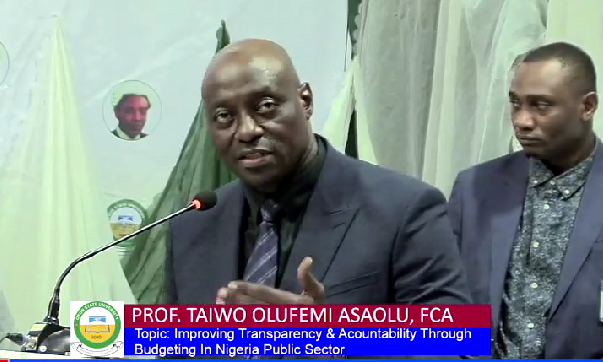
The Vice Chancellor of the University of Ilesa (UNILESA), Prof. Taiwo Asaolu says transparency and accountability in the public sphere could be improved upon through budgeting.
Prof. Asaolu disclosed this on Monday in Osogbo, the Osun State capital, while delivering the 4th Candido Da Rocha annual memorial lecture organised by the Osun State University (UNIOSUN).
The Professor of Accounting described budgeting as a fundamental practice that enables individuals, organizations, and governments to manage their finances effectively.
“Beyond its role in financial planning, budgeting plays a crucial role in fostering transparency and accountability. Budgeting contributes to improving transparency and accountability across three key areas: household budgeting, organizational budgeting processes, and public budgeting processes.
“Budgeting is essential for individuals and families seeking to achieve financial stability and meet their financial goals. Budgeting processes within organizations play a pivotal role in managing resources efficiently and ensuring accountability. Recent years have seen a significant uptick in the importance placed on accountability and transparency in governance in Nigeria thanks in large part to the public budgeting process.
“Budgeting serves as a powerful tool for improving transparency and accountability across various sectors. Whether in households, organizations, or governments, budgeting enables individuals and entities to make informed financial decisions, prioritize spending, track progress, and align resources with goals,” he said.
Existence of Strong Governance and a Sound Public Financial Management System
The UNILESA VC emphasized that robust governance frameworks and a proficient public financial management (PFM) system are essential in the realm of public administration.
According to him, the implementation of rigorous accountability measures for government spending serves to safeguard the welfare of citizens against the possibility of misappropriation of public funds.
“The Public Financial Management (PFM) system, comprising budgeting, expenditure management, revenue collection, and financial reporting, serves as a complementary component to the strong governance framework.
“The implementation of a dependable PFM (Public Financial Management) system can effectively mitigate the risk of misappropriation, corruption, and extravagance of government resources through the consistent application of standardized policies and procedures.
“The implementation of a budgeting system holds significant importance within this framework. Efficient allocation of resources can be achieved by implementing a comprehensive budgeting process that aligns with the objectives of the government and the requirements of the populace,” Asaolu noted.
A Collaboration of Professional Accountants and Auditors within and beyond the Public Sector
Prof. Asaolu observed that professional accountants and auditors from the public and private sectors working together can improve financial transparency, accountability, and management.
According to him, professional associations, working groups, cooperative initiatives, and shared knowledge platforms are all examples of possible settings for such cooperation.
“After discussing the relevant frameworks and standards that contribute to the enhancement of transparency and accountability through budgeting, it is essential to have the appropriate individuals with the proper training skills and core competencies across all governments and public sector institutions.
“This is not unique to the public sector alone because it would further encourage a higher sense of financial discipline and understanding throughout the private sector businesses as well as the people in its totality. In addition, a higher degree of professionalism is obtained as a result of the co-existence of certified accountants and auditors.
“This is because certified accountants and auditors work together to convey the message of ethics and public interest to public leaders. When it comes to the budgeting process, an increased level of transparency and accountability is guaranteed,” he said.
Strengthening Public Voice and Legislative Power
The Accounting guru further encouraged the legislative arm to strengthening its oversight function, while emphasizing on the need to enhance financial reporting; promoting citizen engagement and encouraging open data and information sharing.
“The legislature can effectively monitor the implementation of budgets, evaluate government programs, and hold public officials accountable for their actions. This can be achieved through rigorous reviews, investigations, and hearings.
“Transparent financial reporting is essential to promote accountability in the public sector. Governments should adhere to internationally accepted accounting standards and regularly publish comprehensive financial statements. Timely and accessible reporting allows citizens and stakeholders to scrutinize the use of public funds and hold government officials accountable.
“Involving citizens in decision-making processes and public policy formulation fosters transparency and accountability. Governments can establish platforms and mechanisms that allow for citizen participation, such as public consultations, town hall meetings, and online forums. By considering public opinions, concerns, and feedback, governments can make more informed decisions that align with the interests and needs of the people they serve.
“Open data initiatives contribute to transparency and accountability by making government information and data easily accessible to the public. Governments can establish portals or websites to publish budget documents, procurement information, and other relevant data. This enables citizens, civil society organizations, and the media to analyze and monitor the government’s performance, facilitating public scrutiny and accountability,” Asaolu submitted.















